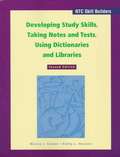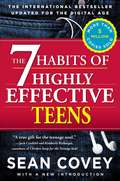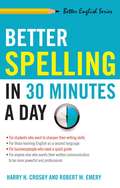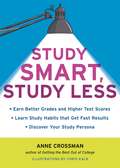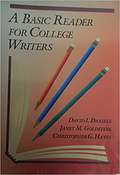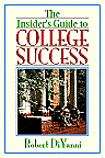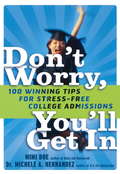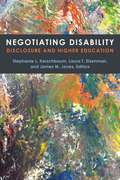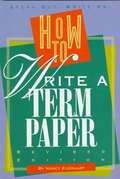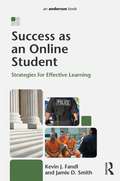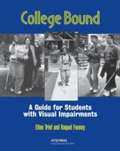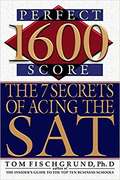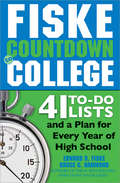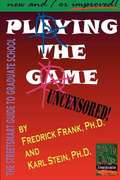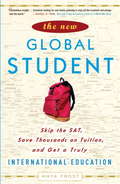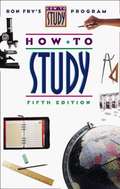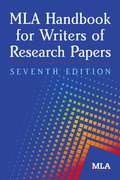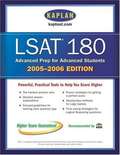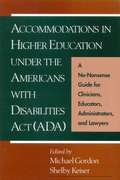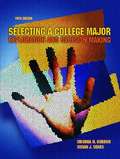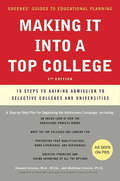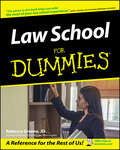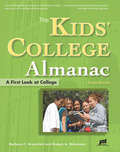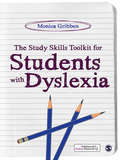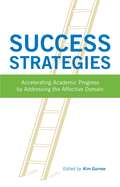Special Collections
Student Resources
- Table View
- List View
Developing Study Skills, Taking Notes and Tests, Using Dictionaries and Libraries
by Marcia J. Coman and Kathy L. HeaversWere you ever taught how to study? Instructors often assume that students beyond grade school know and use good study techniques. You may know some people who seem to be able to do more in less time and get good grades besides. How do they do it? In this unit you will learn some simple techniques that good students consider most important when studying. Now you can discover some of their secrets.
The 7 Habits of Highly Effective Teens
by Sean CoveyWith more than five million copies in print all around the world, The 7 Habits of Highly Effective Teens is the ultimate teenage success guide--now updated for the digital age.Imagine you had a roadmap--a step-by-step guide to help you get from where you are now, to where you want to be in the future. Your goals, your dreams, your plans...they are all within reach. You just need the tools to help you get there. That's what Sean Covey's landmark book, The 7 Habits of Highly Effective Teens, has been to millions of teens: a handbook to self-esteem and success. Now updated for the digital age, this classic book applies the timeless principles of the 7 Habits to the tough issues and life-changing decisions teens face. In an entertaining style, Covey provides a simple approach to help teens improve self-image, build friendships, resist peer pressure, achieve their goals, and get along with their parents, as well as tackle the new challenges of our time, like cyberbullying and social media. In addition, this book is stuffed with cartoons, clever ideas, great quotes, and incredible stories about real teens from all over the world. An indispensable book for teens, as well as parents, teachers, counselors, or any adult who works with teens, The 7 Habits of Highly Effective Teens has become the last word on surviving and thriving as a teen and beyond. "If The 7 Habits of Highly Effective Teens doesn't help you, then you must have a perfect life already."-Jordan McLaughlin, Age 17
Better Spelling In 30 Minutes A Day
by Robert W. Emery and Harry H. CrosbyDo you use the dictionery more then you think you should? Are the business memos you write filled with embarassing spelling mistakes? Have you recieved alot of low grades on your papers because of poor spelling? Did you notice that some of the words in the above questions (dictionary, fhan, embarrassing, received, a lot) were misspelled? If not, you need this book. This easy-to-use workbook not only teaches you how to avoid misspellings like the ones above, but sharpens your skills so you can recognize spelling errors right away. You'll write clean English, improve your grades (if you're a student) and increase your chances for finding a new or better job. (After all, resumes and cover letters with misspelled words often are discarded.) You'll also find: Diagnostic exercises that allow you to identify your weak spelling areas. Thorough coverage of key areas of phonics. The most commonly misspelled words and tricks for spelling them right. Ample opportunity for proofreading practice. Easy-to-understand explanations and plenty of exercises to test and refine your skills. An answer key at the back of the book to encourage you to work at your own pace and check your answers as you go. Even if you can't spare 30 minutes a day to learn how to break your addiction to your computer's spell checker, Better Spelling In 30 Minutes a Day allows you to custom-design your learning to take as little as five minutes a day. Like its companion guides in the Better English SeriesBetter Grammar In 30 Minutes a Day and Better Sentence Writing In 30 Minutes a Daythis book is just what the teacher ordered!
Study Smart, Study Less
by Anne CrossmanReap the rewards of a higher GPA without sacrificing your sanity or your social life! If "I studied all night and I still didn't ace the test" is your mantra, this witty study guide will help you pinpoint your personal learning style, prevent study mishaps, and work to your strengths. Using the best research on memory and the brain, Study Smart, Study Less offers easy techniques to help you: * absorb info quickly* remember it accurately* create a successful study space * put together a productive study group * use interactive games to master tough material* identify pitfalls--and avoid falling into them * and stop overstudying (no--this isn't a typo) By learning how to learn, you'll not only feel smarter, you'll be smarter.From the Trade Paperback edition.
A Basic Reader for College Writers
by Christopher G. Hayes and Janet M. Goldstein and David I. DanielsAlthough this is designed to be a textbook, many readers will enjoy the essays, which are written by a range of authors that includes Jane Brody, John Kellmayer, Ben Fong-Torres, and Mary E. Mebane. The topics of these thirty-two essays cover throwing away food, overcoming alcoholism, learning from Japanese prisons, and baseball.
The Insider's Guide to College Success
by Robert DiyanniProvides techniques on how to be successful in college.
Don't Worry, You'll Get In
by Michele A. Hernandez and Mimi DoeWith more teenagers applying to college today than ever before, the competition has never been stiffer, and the stress can become unbearable not just for teens, but for the entire family. In "DonOCOt Worry, YouOCOll Get In," one of the country's top college admissions counselors Michele Hernandez and leading parenting expert Mimi Doe join forces to bring teens the first college admissions guide of its kind: an easy and accessible book full of 100 specific tips to navigate the admissions process successfully and calmly. For each step, Hernandez explains to teens in simple terms exactly what they need to do, while Mimi Doe empowers them to tackle that step with confidence and in the least stressful way. Covering everything from standardized testing to summer plans to writing a great essay, "DonOCOt Worry, YouOCOll Get In" is the perfect guide for high schoolers who want to be accepted at the school of their choice without burning out for the sake of getting in. "
Negotiating Disability
by Stephanie L Kerschbaum and Laura T Eisenman and James M JonesDisability is not always central to claims about diversity and inclusion in higher education, but should be. This collection reveals the pervasiveness of disability issues and considerations within many higher education populations and settings, from classrooms to physical environments to policy impacts on students, faculty, administrators, and staff. While disclosing one’s disability and identifying shared experiences can engender moments of solidarity, the situation is always complicated by the intersecting factors of race and ethnicity, gender, sexuality, and class. With disability disclosure as a central point of departure, this collection of essays builds on scholarship that highlights the deeply rhetorical nature of disclosure and embodied movement, emphasizing disability disclosure as a complex calculus in which degrees of perceptibility are dependent on contexts, types of interactions that are unfolding, interlocutors’ long- and short-term goals, disabilities, and disability experiences, and many other contingencies.
How to Write a Term Paper
by Nancy EverhartDescribes the steps in writing a term paper, including choosing a topic, doing research, writing an outline, taking notes, doing a rough draft, and editing the final paper.
Success as an Online Student
by Kevin J. Fandl and Jamie D. SmithThis book presents concise guidance to make the online learning journey enjoyable, productive, and most of all, worthwhile.
College Bound
by Ellen Trief and Raquel FeeneyThis book provides an essential reference source, serving as both a step-by-step guide for students to use independently and a much-needed text for educators to use to prepare students with visual impairments and blindness for success in college. It is organized into sections that can be read and worked on independently in whatever sequence best meets the student's needs. Appendixes contain charts that can be reproduced, resources for further information, and sources of products and materials.
1600 Perfect Score
by Tom FischgrundThe author describes the seven qualities that make students who achieve a perfect SAT score stand out. He bases these claims on interviews with students, responses from parents, and College Board data. During his research, Fischgrund asked students about how much time they spend working, reading, watching TV, etc. His conclusions support some of the commonly-accepted thinking about what makes a teen "smart," but he disproves many beliefs as well.
Fiske Countdown to College
by Edward B. Fiske and Bruce G. HammondUnique, simple approach to the complicated college prep process, from the leading authority in college admissions.
The New Global Student
by Maya FrostGood-bye, Old School. Hello, Bold School!In 2005, Maya Frost and her husband sold everything and left their suburban American lifestyle behind in order to have an adventure abroad. The tricky part: they had to shepherd their four teenage daughters through high school and into college. This hilarious and conspiratorial how-to handbook describes the affordable, accessible, and stunningly advantageous options they stumbled upon that any American student can leverage to get an outrageously relevant global education. Ready to ditch the drama of the traditional hypercompetitive SAT/AP/GPA path? Meet the bold American students who are catapulting into the global economy at twenty with a red-hot college diploma, sizzling 21st-century skills, a blazing sense of direction–and no debt. You’ll discover: • the one thing preventing your student from blasting forward• why Advanced Placement isn’t so advanced• why international programs fail to provide a truly global education• the most critical time for your student to study abroad• the best exchange program in the world ($3,000 or less per year)• the strategic way to fast-forward through high school• how to maximize a family sabbatical • how to live the life of your dreams abroad–and save thousands for collegePacked with myth-busting facts, laughable loopholes, insider insights, astonishing success stories, and poignant tales from the Frost daughters themselves, this inspiring romp is guaranteed to get you cheering.
How to Study (5th edition)
by Ron FryHow to Study has gained immense popularity among students of all ages for one simple reason: It works. Now updated and expanded for the information age, this "A-plus" read includes how to create a work environment, excel in class, use the library, do research online, and much more.
MLA Handbook for Writers of Research Papers (7th edition)
by Joseph GibaldiThe seventh edition of the MLA Handbook is a comprehensive, up-to-date guide to research and writing in the online environment. It provides an authoritative update of MLA documentation style.
LSAT 180
by Eric GoodmanThe challenging practice and proven strategies you need to get a perfect score on the LSAT. This advanced guide includes: the toughest questions, the most effective logic games tactics, powerful reading comprehension strategies, top scoring logical reasoning techniques
Accommodations in Higher Education under the Americans with Disabilities Act
by Michael Gordon and Shelby Keiser and Alta LapointThis manual outlines how the ADA applies to a wide range of mental and physical impairments within higher education settings, it outlines a series of fundamental principles and actual clinical/administrative procedure
Selecting A College Major
by Virginia N. Gordon and Susan J. SearsThis innovative text simplifies the process of choosing a major from a sometimes overwhelming array of majors and related career fields. It will assist not only the "undecided" student with selecting a major, but also the "major-changer" who is exploring alternative options. A step-by-step process leads students through personal and academic assessment as well as occupational information searches. Through thought-provoking activities, they can explore their academic, career, and personal interests and goals. Students can investigate academic majors from many perspectives, including a search of majors in general, majors on their campus, and majors based on their academic and occupational interests. Highlights of this text include: *A Natural Decision-Making Progression. Students are directly and personally involved in activities that involve exploration, reflection, and choice. *Extensive Major Exploration. Three distinct approaches help students narrow their list to realistic alternatives. *Incorporation of Academic and Career Interests, Abilities, and Values. Self-assessment gives students information on which to base their choice of a major. *Formulation of a Graduation Plan. Students use their academic transcripts to summarize all they have learned and develop a plan for the future. Features include: *Majors Exploration *Career Advice *Web Links *Tips from Successful Students *Student Bulletin Boards *Faculty Resources
Making It into a Top College
by Matthew W. Greene and Howard GreeneLet America's premier college consultants take the mystery out of admissions. As seen on PBS, this proven, ten-step program offers a comprehensive inside view of the state of college admissions today. Educational consultants Howard and Matthew Greene have mastered the science and art of college admissions, helping tens of thousands of students get into their schools of choice. This highly effective program is now available to all students who want to attend an outstanding college or university. The Greenes' cutting-edge approach will teach you to: Think like an admissions officer Plan a comprehensive admissions campaign Understand and take advantage of current trends Implement the best strategies for standing out Whether it's choosing the best college for you, writing a winning personal statement, or planning your college financing, this fully updated new edition gives you the latest in admissions secrets, statistics, tactics, and facts.
Law School For Dummies
by Rebecca Fae GreeneThe straightforward guide to surviving and thriving in law school Every year more than 40,000 students enter law school and at any given moment there are over 125,000 law school students in the United States. Law school's highly pressurized, super-competitive atmosphere often leaves students stressed out and confused, especially in their first year. Balancing life and schoolwork, passing the bar, and landing a job are challenges that students often need help facing. In Law School For Dummies, former law school student Rebecca Fae Greene uses straight talk, sound advice, and gentle humor to help students sort through the swamp of coursework and focus on what's important-all while maintaining a life. She also offers rare insight on the law school experience for women, minorities, non-traditional, and non-Ivy League students.
The Kids' College Almanac
by Barbara C. Greenfield and Robert A. WeinsteinA fun and interesting way for middle school students to get their first information about college and how it's a possible and worthwhile goal to pursue. Starts with the basics and gives a comprehensive overview of everything the student can expect when exploring college--all in bite-sized pieces.
The Study Skills Toolkit for Students with Dyslexia
by Monica Gribben'This toolkit is the student's safety net offering user friendly, down to earth advice and real life skills that have been tried and tested by the author'-Dr John Schneider, Educational Psychologist, Edinburgh 'This is exactly how I felt starting university ... a wonderful and very helpful book full of interesting and useful hints and tips on how to survive university as a dyslexic student. It doesn't make you feel silly or stupid but makes you feel you can achieve what you set out to do'-Sharon Patterson, Adult Nursing student, Edinburgh Napier University 'You realize you're in the hands of a professional who has taught thousands of students how to succeed at university'-Holly Pellicer, Dyslexia Advisor, University of Oslo Packed with helpful advice, checklists and templates, this book will help you improve your study skills throughout your time at university. Written in a straightforward, no- nonsense style, the guidance can be broken down into manageable chunks. Issues covered include: - procrastination - planning your assignment - understanding your essay question - researching, writing and referencing your written work - managing your own well-being. Drawing on years of experience running study skills workshops in higher education, Monica Gribben has written an accessible book for students with dyslexia that shows how to work through the challenges that studying presents. The companion Website www.sagepub.co.uk/gribben has podcasts, worksheets and electronic resources to support each chapter. Monica Gribben is a private dyslexia consultant and Dyslexia Adviser at Edinburgh Napier University.
Success Strategies
by Kim GurneeThe book presents fourteen success strategies in a concise format and helps students cultivate the mindset that focuses on growth.
